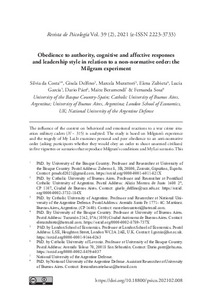Por favor, use este identificador para citar o enlazar este ítem:
https://repositorio.uca.edu.ar/handle/123456789/12488| Título: | Obedience to authority, cognitive and affective responses and leadership style in relation to a non-normative order: the Milgram experiment | Autor: | Da Costa, Silvia Delfino, Gisela Murattori, Marcela Zubieta, Elena García, Lucía Páez, Dario Beramendi, Maite Sosa, Fernanda |
Palabras clave: | CRIMENES DE GUERRA; VALORES; OBEDIENCIA; AUTORIDAD; PSICOLOGIA MILITAR; ESTILOS DE LIDERAZGO | Fecha de publicación: | 2021 | Editorial: | Pontificia Universidad Católica del Perú | Cita: | Da Costa, S. et al. Obedience to authority, cognitive and affective responses and leadership style in relation to a non-normative order: the Milgram experiment [en línea]. Revista de Psicología. 2021, 39 (2). doi: https://doi.org/10.18800/psico.202102.008. Disponible en: https://repositorio.uca.edu.ar/handle/123456789/12488 | Resumen: | Abstract: The influence of the context on behavioral and emotional reactions to a war crime situation military cadets (N = 315) is analyzed. The study is based on Milgram’s experience
and the tragedy of My Lai.It examines personal and peer obedience to an anti-normative
order (asking participants whether they would obey an order to shoot unarmed civilians)
in five vignettes or scenarios that reproduce Milgram’s conditions and MyLai scenario. This is an experimental between-within study of five scenarios by two conditions (Milgram,
1974). Personal and collective obedience of other military, emotional reactions and values
of Schwartz (2012) were measured. Showing enhancement of self-bias it is reported that the
pairs would be more likely to shoot than one would. Replicating Milgrams’s results, obedience is greater when the order is given directly by an authority, and lower when there is
conflict between authorities and peers rebel. Confirming that identification with humanity
and not just with the in-group may prompt respondents to reject an anti-normative order,
values of transcendence of the self are associated with less obedience and congruent emotional reactions. Self-perceived transformational leadership was associated with positive
emotions towards peer that disobey to fire. However a transformational style perceived in
the superior was associated to positive emotions by respect to soldier who open fire, adding
information on the potential dark side of this leadership style. The relevance of personal
values, leadership style and affectivity in military context is discussed. Resumen: Se analiza la influencia del contexto en las reacciones conductuales y emocionales ante una situación de crimen de guerra en cadetes militares (N = 315). El estudio se basa en la experiencia de Milgram y en la tragedia de My Lai. Examina la obediencia personal y de los compañeros ante una orden antinormativa (preguntando a los participantes si obedecerían una orden de disparar a civiles desarmados) en cinco viñetas o escenarios que reproducen las condiciones de Milgram y el escenario de MyLai. Se trata de un estudio experimental entre dos escenarios por dos condiciones (Milgram, 1974). Se midió la obediencia personal y colectiva de otros militares, las reacciones emocionales y los valores de Schwartz (2012). Mostrando el aumento de la auto-prejuicio se informa de que los pares serían más propensos a disparar que uno. Replicando los resultados de Milgram, la obediencia es mayor cuando la orden es dada directamente por una autoridad, y menor cuando hay conflicto entre autoridades y compañeros rebeldes. Confirmando que la identificación con la humanidad y no solo con el grupo interno puede impulsar a los encuestados a rechazar una orden antinormativa, los valores de trascendencia del yo se asocian con menos obediencia y reacciones emocionales congruentes. El liderazgo transformacional autopercibido se asoció con emociones positivas hacia los compañeros que desobedecen al fuego. Sin embargo un estilo transformacional percibido en el superior se asoció a emociones positivas por respeto al soldado que abre fuego, añadiendo información sobre el potencial lado oscuro de este estilo de liderazgo. Se discute la relevancia de los valores personales, el estilo de liderazgo y la afectividad en el contexto militar. |
URI: | https://repositorio.uca.edu.ar/handle/123456789/12488 | ISSN: | 2223-3733 | Disciplina: | PSICOLOGIA | DOI: | https://doi.org/10.18800/psico.202102.008 | Derechos: | Acceso abierto | Fuente: | Revista de Psicología Vol.39, No.2, 2021 |
| Aparece en las colecciones: | Artículos |
Ficheros en este ítem:
| Fichero | Descripción | Tamaño | Formato | |
|---|---|---|---|---|
| obedience-authority-cognitive.pdf | 238,46 kB | Adobe PDF |  Visualizar/Abrir |
Visualizaciones de página(s)
125
comprobado en 27-abr-2024
Descarga(s)
78
comprobado en 27-abr-2024
Google ScholarTM
Ver en Google Scholar
Altmetric
Altmetric
Este ítem está sujeto a una Licencia Creative Commons

